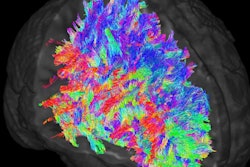
Should patients undergoing MRI scans be concerned about genetic damage? It's a relatively novel question, but one that's percolated to the surface in the past several years. Fortunately, a new literature review found little evidence to support the idea that MRI can cause genetic damage.
Researchers reviewed 10 studies, six of which were published in the last four years. While two papers reported increases in DNA damage, or genotoxicity, the others did not support those findings. The authors concluded that there is not enough relevant data to state that MRI is associated with genetic damage.
"We don't think there is any proven hazard," said co-author John Moulder, PhD, professor emeritus in the department of radiation oncology at the Medical College of Wisconsin. "We are certainly not advocating that patients forego medically justified imaging on account of this as-yet hypothetical problem."
Risk assessment
The idea that MRI could have a genetic impact first arose in a 1980 study by Wolff et al; they concluded that nuclear magnetic resonance did not cause damage to DNA or chromosomes. Since 2007, a number of studies have been published on the issue, with a handful reporting some effects such as chromosome aberrations and DNA damage.
 John Moulder, PhD, from Medical College of Wisconsin.
John Moulder, PhD, from Medical College of Wisconsin.Indeed, in a 2015 review paper in Mutation Research, Vijayalaxmi et al called for comprehensive international studies using a common MRI scanning protocol and including several end points of genetic and epigenetic damage. Such a research initiative would be both extensive and expensive, Moulder and colleagues noted.
Therefore, Moulder et al decided to perform a more rigorous review of published literature on MRI and genetic damage. He and bioengineering colleagues Kenneth Foster, PhD, from the University of Pennsylvania, and Thomas Budinger, PhD, from the University of Berkeley and Lawrence Berkeley National Laboratory, have performed risk assessments on various forms of nonionizing radiation fields and technologies for more than two decades (Radiation Research, January 2017, Vol. 187:1, pp. 1-6).
"The idea of looking for possible genotoxicity of new exposures, new drugs, and almost anything new is a fairly standard thing to do," Moulder said.
The group aimed to address three questions:
- Is there a real genotoxic effect from MRI?
- What evidence suggests that adverse effects might be caused by exposure to electromagnetic fields or radiofrequency (RF) from MRI?
- What are the potential side effects, if any?
The authors specifically chose to address cardiac MRI, as a number of research papers on MRI genotoxicity focused specifically on this area.
Mixed results
Based on their review of the 10 studies published between 2007 and 2016, the evidence of MRI's association with genotoxicity is "at best, mixed," Moulder and colleagues wrote. "Apart from their small size, the studies frequently lacked obvious quality control measures, variously including blinding, sham exposures, concurrent controls, and positive controls."
Regarding potential side effects from the magnetic-related physics of MRI technology, previous research has focused primarily on RF and its static and gradient fields, the authors noted.
"The focus is usually on some sort of physical insult, be it the RF or the static and gradient fields; that is the implication," said Moulder, who also serves as senior editor for Radiation Research. "All three parts of the physics have all been studied separately. None of them are implicated in genotoxicity with any really good data."
Benefit vs. risk
Perhaps the most important question is whether these adverse effects actually exist. Focusing on the debated connection between MRI and DNA damage, the authors related the activity to natural DNA function.
"Every human cell experiences numerous breaks in its DNA every day, and nearly all are quickly repaired," they wrote. "The health significance of DNA damage foci, particularly from infrequent and one-of-a-kind events such as an MRI exam, is unclear."
When a decision must be made as to whether a patient should undergo an MRI scan, the benefits greatly outweigh the risks -- especially when the alternative is an imaging exam that uses ionizing radiation.
"If you are concerned for whatever reason that cardiac MRI scans may be carcinogenic, if you look at the typical [cardiac] patient, cancer is not their concern," Moulder said. "Most of these patients are being evaluated because they have potentially serious cardiac problems."
But what about pediatric patients, who might face the prospect of multiple MRI scans over their lifetimes? Wouldn't the issue of genotoxicity carry more weight?
"Even if this effect were real, and if it did, in fact, indicate that something about [MRI] was carcinogenic, most of these patients have other problems that will kill them long before they have to worry about cancer," Moulder said. "We certainly don't think the data-driven concern is sufficient to justify a reason to suggest special caution with MRI other than the usual, 'If you don't need it and it won't provide you with valuable medical data, don't do it.' There is nothing new about that."
To be clear, the authors are not totally discounting the possibility that MRI might cause adverse side effects and/or contribute to genotoxicity, but the current research data do not support such a conclusion. In addition, if future research studies are performed to investigate the issue, they should be better designed than the ones that have been performed to date.
"If you want to do something next, do a very well-designed, large study of the types that have already been done, but with better statistics and better controls," Moulder said. "And make sure that this punitive genotoxicity is even real before beginning more expensive follow-up studies."




















